Home > 招聘研究者
招聘研究者
2017年09月
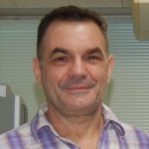
Bob Robinson
(Principal Investigator of IMCB Singapore, Visiting Professor of Okayama University)
Presented at
- International Symposium on "Harmonized supramolecular motility machinery and its diversity"
- Osaka city university
- The 55th Annual Meeting of the Biophysical Society of Japan
One recipe for having fun in science is to identify an important problem, be surrounded by enthusiastic and creative people, and then eat, drink and breathe the science. The Miyata laboratory has all of these elements in abundance. It clearly is an inspiring place to work, and a special place to visit. They are dedicated to deciphering how their Matryoshka doll and corkscrew shaped organisms move – important questions in understanding the various paths of evolution in developing motility. Besides having fascinating science, the Miyata laboratory are also fabulous hosts. I particularly enjoyed a visit to a local Izakaya, where the beers are “oh my God” uncommonly large and the conversation is broad and delightful.
IMCB websiteOkayama university website
2017年03月
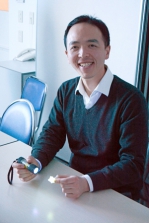
Yi-Wei Chang
(California Institute of Technology)
Presented at The 90th Annual Meeting of Japanese Society for Bacteriology (March 2017)
Title: Architecture of the type IVa and IVb pilus machines
It was my great pleasure and honor to be invited by Prof. Miyata to present our latest results on bacterial type IV pilus machines at the 90th Annual Meeting of Japanese Society for Bacteriology. I have enjoyed this excellent conference and was particularly excited to learn many new insights into the bacterial pili and archaeal flagella from my fellow section speakers. Other than the conference, I had great opportunities to visit and give seminars at four different places: Tamakoshi lab in Tokyo University of Pharmacy and Life Science, Namba lab in Osaka University, Miyata lab in Osaka City University, and Nakayama lab in Nagasaki University. In Osaka University I have also visited the Ultra-high voltage electron microscopy center and amazed by those gigantic MeV electron microscopes. Throughout my trip, I was immersed in the wonderful hospitality of my varies hosts, which I was deeply grateful for. I have enjoyed the stimulating discussions and facility tours in each lab, and was especially thankful for the thoughtful arrangements from my main host Prof. Miyata. I also admired his energy very much.
I would like to express my sincere thanks to all the people shared time with me. I have enjoyed every second spent during this memorable Japanese trip.
2016年03月
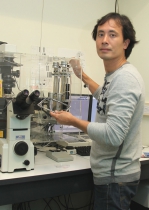
Tâm Mignot
(research director CNRS-Aix Marseille University )
The Japanese scientific community is highly regarded for its work on various forms of bacterial motility. I long wanted to visit Japan and meet colleagues to discuss common interests on proton-driven motors and gliding motility. For this reason, I was particularly excited to accept invitation by Prs Miyata and Homma to attend the 89th conference of the Japanese Society of Bacteriology. The Motility session, where I had the honor to give the closing talk was up to the highest scientific standards, with memorable talks on the flagellar stator and rotor complexes, gliding motility in Mycoplasma and Bacteroidetes and chemotaxis in magnetotactic bacteria. After the conference, I enjoyed additional days visiting my colleagues’ laboratories and sharing results, as well as new approaches and techniques; deep freeze EM microscopy in the Miyata lab, Cryo-EM tomography in the Namba lab and flagellar stator purification techniques in the Homma lab. In general, I was very impressed by the expertise that I discovered and fruitful collaborations will follow. In the Miyata lab, we actually performed an exciting EM experiment on Myxococcus, which calls for further work together. I especially want to thank my hosts for their hospitality, patiently navigating me through the complex (but efficient) Japanese train system and showing me to Sakura customs, delicious foods and abundant sake in memorable socials!
2015年03月
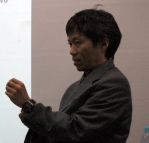
大澤 正輝
(Department of Cell Biology, Duke University Medical Center,Assistant Research Professor of Cell Biology)
Presented at The 87th Annual Meeting of Japanese Society for Bacteriology(March 2015) Title:Reconstitution of contractile ring for bacterial division
I was excited and honored by the invitation from Prof. Miyata to participate in The 88th Annual Meeting of Japanese Society for Bacteriology. Prof. Miyata also coordinated my visit to three famous labs including his own. As I was educated and trained in Japan, I wanted to share useful information from research in the USA with the Japanese scientific community as much as I can. However, I learned much more than what I presented in the meeting and seminars through many great questions, comments, discussions and impressive talks from excellent researchers. I would also like to thank each lab for great hospitality to me. Prof. Homma and Dr. Kojima at Nagoya University showed me how flagella motors work. Their enthusiasm and kind thoughtfulness overcame my jet lag. Prof. Ichikawa and Dr. Nishigami at Kyoto University explained to me how soft materials behave in terms of physics. We enjoyed many of the best sake brands at dinner. At Osaka City University, Prof. Miyata introduced to me his lab where many sophisticated equipment and devices are installed. Prof. Katayama, Dr. Tahara and Dr. Bertin kindly showed me the principle and usage of a quick freeze replica EM. Dr. Tulum took care of me especially as a chairman in my seminar. We had a great cherry blossom party “Hanami” which I have missed for more than 15 years. Lastly I would like to leave my many thanks to all people who helped me during my trip.
2014年03月
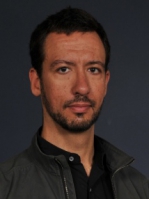
Morgan Beeby
(Imperial College London)
Presented at The 87th Annual Meeting of Japanese Society for Bacteriology(March 2014)
Title: What structural dissection of bacterial flagellar motors in situ tells us about molecular mechanism and evolution
It was my pleasure and honour to be invited to visit Japan for my first time to speak at the Japanese Society for Bacteriology meeting. My host Prof. Miyata made the entire trip extremely enjoyable and memorable, allowing me time to visit a number of other labs in Japan, including his own. My fellow conference speakers delivered excellent talks, providing one of the most interesting conference sessions I can recall, and the quality and enthusiasm of questions was very high, from both established PIs but also postdocss and students. I was consistently impressed by the wonderful hospitality and thoughtfullness of my hosts, and also thoroughly enjoyed the cherry blossoms (my visit, it seems, was perfectly timed), and the incredible transportation systems in Japan, in particular the Shinkansen!
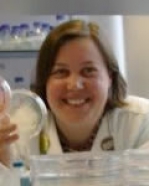
Liz (RE) Sockett
(School of Life Sciences, University of Nottingham, United Kingdom)
Presented at flagellar meeting (March 2014)
Title: Predatory Surface Appendages of Predatory Bacteria-Studies with a Sensei
I was honored to bee asked to speak at the Japanese flagellar meeting in March 2014 and to honor Professor Shin-Ichi Aizawa. Prof Aizawa has been a great mentor, friend and sensei to many visiting scientists and graduate students from my lab over the years. The science at the meeting was of a great standard and I enjoyed the friendly participation of the graduate students, both male and female. The organisation of the meeting by many people, including Hiroshima graduate students, was excellent and Prof Homma and Dr Kojima were excellent academic hosts for the meeting. Thank- you for a great visit to Hiroshima.
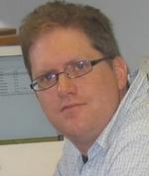
Phillip Aldridge
(Centre for Bacterial Cell Biology, Newcastle University United Kingdom)
Presented at flagellar meeting (March 2014)
Title: Flagellar Numbers: Its regulation and impact on host recognition
The Japanese flagellar meeting has a reputation across the international community for being a unique opportunity to focus our discussions on bacterial motility. It was especially an honour this year to be invited to this meeting to celebrate the achievements of Prof. Shi-ichi Aizawa through his illustrious career. I found this years meeting very inspirational to reflect on past successes and discuss the boundaries we are pushing ever forward in our field. The meeting was well balanced with a perfect mix of talks from the international guests complimented with those from Grad students and Post-docs selected from the Japanese flagellar community. Well done to the organizes and good luck to Chi for his plans on retirement.
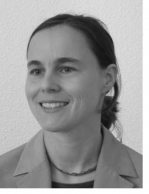
Christine Josenhans
(Hannover Medical University, Hannover, Germany)
Presented at flagellar meeting (March 2014)
Title: Flagella of epsilonproteobacteria: not just for motility
It was a great honour for me to participate in the 19th flagellar meeting at Hiroshima, and to present own novel results to a very interested and interactive audience. The meeting was very interesting and fruitful; not only because it was held at the special occasion of the retirement of a very valued scientific colleague and friend for many years, Shin-Ichi Aizawa of Hiroshima Prefectural University, but also due to its cutting-edge scientific content presented by mostly young Ph.D. students and post-docs. Everybody discussed many unpublished data from the “flagellar world” with lots of enthusiasm and knowledge. It was also a great opportunity to meet and discuss science around the bacterial flagellar secretion apparatus and chemotaxis with other distinguished researchers from Japan and from all over the world, Korea, UK, Australia, Hongkong and the United States. Moreover, the participation at this particular place was much appreciated, since Hiroshima is connected as a twin city with my university’s place at Hannover (Germany) .
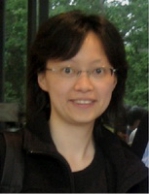
AU Wing Ngor Shannon
(School of Life Sciences The Chinese University of Hong Kong)
Presented at flagellar meeting (March 2014)
Title: Structural characterization of H.pylori motor switch complex
This was my first time to join the Flagellar Meeting and I enjoyed it very much. This is a great meeting focusing on both molecular genetics and mechanistics studies on bacterial flagella. All presentations contributing by local and overseas scientists are of very high impact and many of them have not yet published. I am also very impressed by the well-established and strong-bonded flagellar family in Japan that encourage interactions to strive for excellence in the field. Once again, I thank Prof. Michio Homma for his kind support for my visit to this meeting.
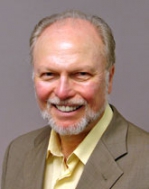
Hazelbauer, Gerald L.
(Department of Biochemistry, University of Missouri, USA)
Presented at flagellar meeting (March 2014)
Title: Transmembrane chemoreceptors: complex interactions and sophisticated signaling
I was extremely pleased to be invited to the 2014 Bacterial Flagella Meeting in Hiroshima, Japan. It was a great pleasure to participate at this meeting in honoring Professor Shi-ichi Aizawa on the occasion of his retirement. It was impressive to see the sustained level of interest in Japan for studies of bacterial flagella and sensory signaling. Particularly striking was the number of graduate students and other young Japanese scientists in attendance and the number of these who were female. This promises continuation of sustained contributions over many years by Japanese scientists to our understanding of these flagella and the signaling systems that control them.
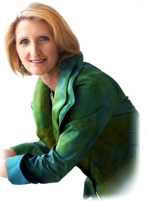
Linda J. Kenney
(Mechanobiology Institute, NUS Singapore)
Presented at flagellar meeting (March 2014)
Title: Acidification of the Salmonella Cytoplasm in the Macrophage Vacuole Requires OmpR and Drives SPI-2 Type Three Secretion
I think that small, focused meetings such as the Flagellar Meeting are a unique opportunity for scientists to come together and share unpublished results and have intense discussions around a topic of interest. It is also an important venue for junior researchers in Japan to present their work to a small, but international audience. Attending this meeting was a rewarding experience for me and I look forward to attending future meetings.
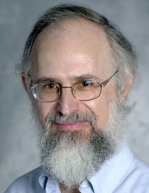
Michael Eisenbach
(The Weizmann Institute of Science, Israel)
Presented at flagellar meeting (March 2014)
Title: Phosphorylation-independent switching of the direction of flagellar rotation
My participation at the flagellar meeting in Hiroshima was both enjoyable and educating. It was a true pleasure to listen to truly excellent talks at the forefront of science, to reunion with Japanese friends and colleagues whom I have not met for many years, to see the scientific enthusiasm of the young generation of students, and to learn new techniques employed by them. My contribution was a talk entitled “Phosphorylation-independent switching of the direction of flagellar rotation”. Prior to the meeting, I visited Shimane University in Matsue and gave there a talk on “Sperm guidance in mammals”. All in all, taken with the wonderful hospitality of the Japanese hosts, it was a memorable meeting and visit.
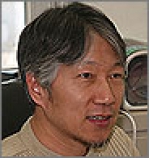
Chankyu Park
(Korea Advanced Institute of Science and Technology)
Presented at flagellar meeting (March 2014)
Title: Redox and flagellar expression
The international flagellar meeting that was held in March, 2014 was a memorable experience for me. The topics and organization were well focused on various aspects of bacterial flagella. I enjoyed a lot on its scientific content as well as on the depth of discussion. The conference site and social program were also carefully managed and prepared. Hopefully, this annual meeting has to be continued in the future.
2013年10月
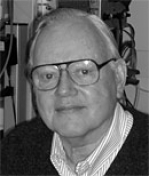
Howard Berg
(Herchel Smith Professor of Physics and Professor of Molecular and Cellular Biology, Harvard University)
Presented at The 51st Annual Meeting of the Biophysical Society of Japan "Featured lecture of Howard Berg and dancing supramolecular motility machineries."(October 2013)
Title: Wonders of bacterial motility
My trip to Japan was sponsored by Makoto Miyata’s project, “Harmonized supramolecular motility machinery and its diversity.” He proved to be a wonderful host. I gave a talk for his undergraduate students entitled, “Growth of bacterial flagellar fiaments,” which was a lot of fun. The students, in their best English, asked wonderful questions. I spoke at the 51st Annual Meeting of the Biophysical Society of Japan, on the “Wonders of bacterial motility,” about adaptation at the output of the bacterial chemotaxis network. Fumio Oosawa gave the final talk of our session, which was a great honor. When spinning counterclockwise, flagellar motors add copies of the protein FliM, the component to which the chemotaxis response regulator, CheY-P, binds, thus increasing the motor’s sensitivity to that molecule. When subjected to increased viscous load, motors add new stator elements, thus increasing their ability to deliver torque. I also gave talks on this subject at Osaka University, hosted by Keiichi Namba, and at Osaka City University, hosted by Makoto Miyata. It was stimulating to meet graduate students and postdoctoral fellows at both institutions. My visit ended with a trip to Nara, my favorite corner of Japan. I thank my hosts for finding interesting restaurants, including those that allowed me to avoid raw fish and to enjoy Chinese dumplings.
2013年03月
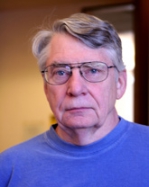
John Sandy. Parkinson
(Distinguished Professor of Biology, University of Utah)
Presented at flagellar meeting (March 2013)
Title: Signaling by Bacterial Chemoreceptors: A Dynamic Story?
It was my distinct honor and pleasure to attend the 2013 Bacterial Flagella Meeting in Ikaho, Japan. This annual meeting brings together many of the world's leading laboratories in the study of bacterial motility and chemosensing. The science presented at the meeting, much of it not yet published, used a wide variety of cutting-edge methodologies. I learned a great deal and plan to apply some of the new experimental approaches that I heard about to my own group's studies of bacterial chemoreceptors.
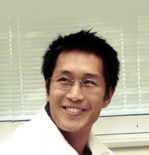
Lawrence Lee
(Group Leader Molecular Motors Laboratory Structural and Computational Biology Division, Victor Chang Cardiac Research Institute)
Presented at flagellar meeting (March 2013)
Title: Structure and switching mechanism of flagellar motor switch complex
Thank you for the opportunity to visit Japan and to participate in the “18th Japan Flagella Meeting”. It was a privilege to be a part of this wonderful meeting from both a scientific and cultural perspective. Flagella-mediated motility encompasses multiple sub-systems that facilitate processes such as sensory transduction, signal amplification, biological motor function and protein export, all of which are interesting and complex in their own right. These necessarily integrate into a complete system to facilitate bacterial chemotaxis, for which elucidating a complete picture is a formidable challenge for the biological sciences. I felt that the Japanese flagella community had a refreshingly collaborative spirit, which in combination with their obvious strengths across many disciplines including genetics, biophysics and structural biology, puts this community at the front of our efforts to understand flagella-mediated motility. This was clearly demonstrated by the science presented at the Flagella Meeting.
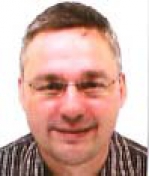
David Popp
(Insitute of Molecular and Cell Biology Singapore)
Presented at The 86th Annual Meeting of Japanese Society for Bacteriology (March 2013)
Title: Novel structures, suprastructures and dynamics in bacterial actins
I really enjoyed the meeting especially the session on nano machines. Most important and this is what such meetings are good for, we have established a new collaboration on bacterial filament systems with a group from Kanazawa University. The meeting was extremely well organized and the location at Tokyo bay made my stay very enjoyable.
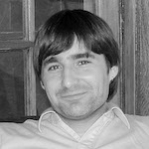
Tom Bernhardt
(Harvard Medical School)
Presented at The 86th Annual Meeting of Japanese Society for Bacteriology (March 2013)
Title: The ABCs of bacterial cell division
I thoroughly enjoyed my visit to Nagoya University and the annual meeting for the Japanese Society for Bacteriology. I was honored to have the opportunity to present my work and receive excellent feedback at both venues. I also was impressed with the scientific talks and presentations that I attended. I especially enjoyed interacting with the students at Nagoya University and providing them with advice on their projects. Drs. Homma and Kojima were excellent hosts. All in all, it was an excellent trip for me scientifically and personally.
2012年09月
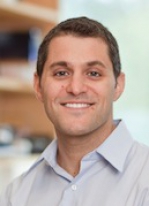
Joshua W. Shaevitz
(Princeton University, Departments of Physics and Genomics)
Presented at The 50th Annual Meeting of the Biophysical Society of Japan (September 2012)
Title: Molecular motor driven self-organization in Myxococcus xanthus
I greatly enjoyed my visit to Japan and especially my participation in the "Harmonized supramolecular motility machinery and its diversity" symposium. My research over the past decade has focused largely on understanding new types of motility systems in bacteria and it was wonderful to see the enthusiasm for this approach at the meeting. In particular, the work being done linking spatial scales and the multidisciplinary approaches to biophysical problems promises to lead to significant discoveries. While much work has focused on the mechano-chemical potential on single-molecule motor systems such as kinesin and myosin, understanding how larger, multi-protein assemblies represents a more difficult challenge. Only by combining strengths from different disciplines, as proposed in this project, can we hope to comprehend these amazing machines.